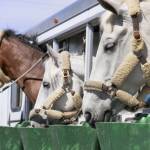Diet, Omegas Help Control Equine Infectious Diseases

It’s horse-show time! This means you’ll likely be transporting your horses to local fairgrounds or other venues and exposing them to unfamiliar horses and foreign pathogens. Not all horses exposed to disease-causing viruses or bacteria become ill, thanks largely to a series of events orchestrated by the intricate components of their immune systems.
How can you ensure your horse’s immune system is ready to do battle with whatever evil it may encounter at your next competition? According to Kathleen Crandell, Ph.D., a Kentucky Equine Research nutritionist, the three pillars to a successful, healthy immune system are (1) routine preventative veterinary care, including appropriate vaccinations; (2) instillation and enforcement of appropriate biosecurity protocols and infection control strategies tailored to your individual facility’s needs; and (3) a well-designed nutritional program to support the development and maintenance of a healthy immune system.
“Ensuring your horse’s diet meets the horse’s energy needs without supplying a surplus of calories and provides the right balance of macro- and micronutrients will maximize the immune system’s efficiency,” explained Crandell.
Considering it is impossible to know exactly what pathogen your horse might encounter at an event, it is impossible to be completely prepared to fight it. Owners should therefore take every conceivable step to protect their horses. This might be a daunting task, considering that there remain so unknown aspects of pathogen life cycles. Take for example the fact that mounting evidence supports the hypothesis that domestic dogs play a role in the spread of African horse sickness, one the deadliest equine diseases in the world*. Or, as an example closer to home, the fact that snakes appear to serve as reservoirs for the Eastern equine encephalitis virus, allowing the virus to overwinter in North America**.
Equine experts agree that taking any steps to boost a horse’s immune system will be more than worthwhile.
“Kentucky Equine Research offers one-on-one nutritional counseling to evaluate and tweak your horse’s current diet,” Crandell shared.
With specific regard to disease prevention, she added, “Studies show that supplementing a horse’s diet with omega-3 fatty acids helps bolster the immune system.”
This is one of the many reasons why Kentucky Equine Research recommends supplementing horses with EO-3, a potent marine-derived, palatable oil rich in both DHA and EPA.
*Oura, C. 2018. A possible role for domestic dogs in the spread of African horse sickness virus. Veterinary Record. 182(25):713-714.
**Bingham, A.M., S.P. Graham, N.D. Burkett-Cadena, et al. 2012. Detection of Eastern equine encephalomyelitis virus RNA in North American snakes. American Journal of Tropical Medicine and Hygiene. 87(6):1140-4.








